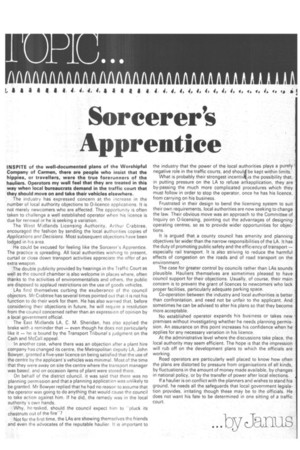Sorcerer's Apprentice
Page 165

If you've noticed an error in this article please click here to report it so we can fix it.
INSPITE of the well-documented plans of the Worshipful Company of Carmen, there are people who insist that the hippies, or travellers, were the true forerunners of the hauliers. Operators my well feel that they are treated in this way when local bureaucrats demand in the traffic court that they should move on and take their vehicles elsewhere.
The industry has expressed concern at the increase in the number of local authority objections to 0-licence applications. It is not merely newcomers who are affected. The opportunity is often taken to challenge a well established operator when his licence is due for renewal or he is seeking a variation.
The West Midlands Licensing Authority, Arthur Crabtree, encouraged the fashion by sending the local authorities copies of Applications and Decisions. Most subsequent objections have been lodged in his area.
He could be excused for feeling like the Sorcerer's Apprentice. The practice is spreading. All local authorities wishing to present, curtail or close down transport activities appreciate the offer of an extra weapon.
The double publicity provided by hearings in the Traffic Court as well as the council chamber is also welcome in places where, often thanks to the activities of environmentalists and others, the public are disposed to applaud restrictions on the use of goods vehicles.
LAs find themselves curbing the exuberance of the council objectors. Mr Crabtree has several times pointed out that it is not his function to do their work for them. He has also warred that, before considering their objections in future, he will require a resolution from the council concerned rather than an expression of opinion by a local government official. .
The East Midlands LA, C. M. Sheridan, has also applied the brake with a reminder that — even though he does not particularly like it — he is bound by the Transport Tribunal's judgment on the Cash and McCall appeal.
In another case, where there was an objection after a plant hire company has changed its centre, the Metropolitan deputy LA, John Bowyer, granted a five-year licence on being satisfied that the use of the centre by the applicant's vehicles was minimal. Most of the time that they were away on site the centre where the transport manager was based, and on occasion items of plant were stored there.
On behalf of the district council, it was said that there was no planning permission and that a planning application was unlikely to be granted. Mr Bowyer replied that he had no reason to assume that the operator was going to do anything that would cause the council to take action against him. If he did, the remedy was in the local authority's own hands.
Why, he 'asked, should the council expect him to "pluck its chestnuts out of the fire''?
Not for the first time, the LAs are showing themselves the friends and even the advocates of the reputable haulier. It is important to the industry that the power of the local authorities plays a purely negative role in the traffic courts, and shoulpi be kept within limits. What is probably their strongest incentivtis the possibility that, in putting pressure on the LA to refuse anlapplication, they are by-passing the much more complicated procedures which they must follow in order to stop the operator, once he has his licence, from carrying on his business.
Frustrated in their design to bend the licensing system to suit their own requirements, local authorities are now seeking to change
the law. Their obvious move was an approach to the Committee of Inquiry on 0-licensing, pointing out the advantages of designing operating centres, so as to provide wider opportunities far objections.
It is argued that a county council has amenity and planning objectives far wider than the narrow responsibilities of the LA. It has the duty of promoting public safety and the efficiency of transport — especially rail transport. It is also striving to reduce the harmful effects of congestion on the roads and of road transport on the environment.
The case for greater control by councils rather than LAs sounds plausible. Hauliers themselves are sometimes pleased to have
council support for their objections. Usually, of course, their main concern is to prevent the grant of licences to newcomers who lack proper facilities, particularly adequate parking spade.
Co-operation between the industry and local authorities is better than confrontation, and need not be unfair to the applicant. And sometimes he can be advised to alter his plans so that they become more acceptable.
No established operator expands his business or takes new premises without investigating whether he needs planning permission. An assurance on this point increases his confidence when he applies for any necessary variation in his licence.
At the administrative level where the discussions take place, the local authority may seem efficient. The hope is that the impression will rub off on the development plans to which the officials are working.
Road operators are particularly well placed to know how often the plans are distorted by pressure from organisations of all kinds, by fluctuations in the amount of money made available, by changes in national policy, or by the transfer of power after local elections.
If a haulier is on conflict with the planners and wishes to stand his ground, he needs all the safeguards that local government•legisla tion provides, irritating though these may be to the officials. He does not want his fate to be determined in one sitting of a traffic court.
...byJam_s








































































































































































































































































































































































